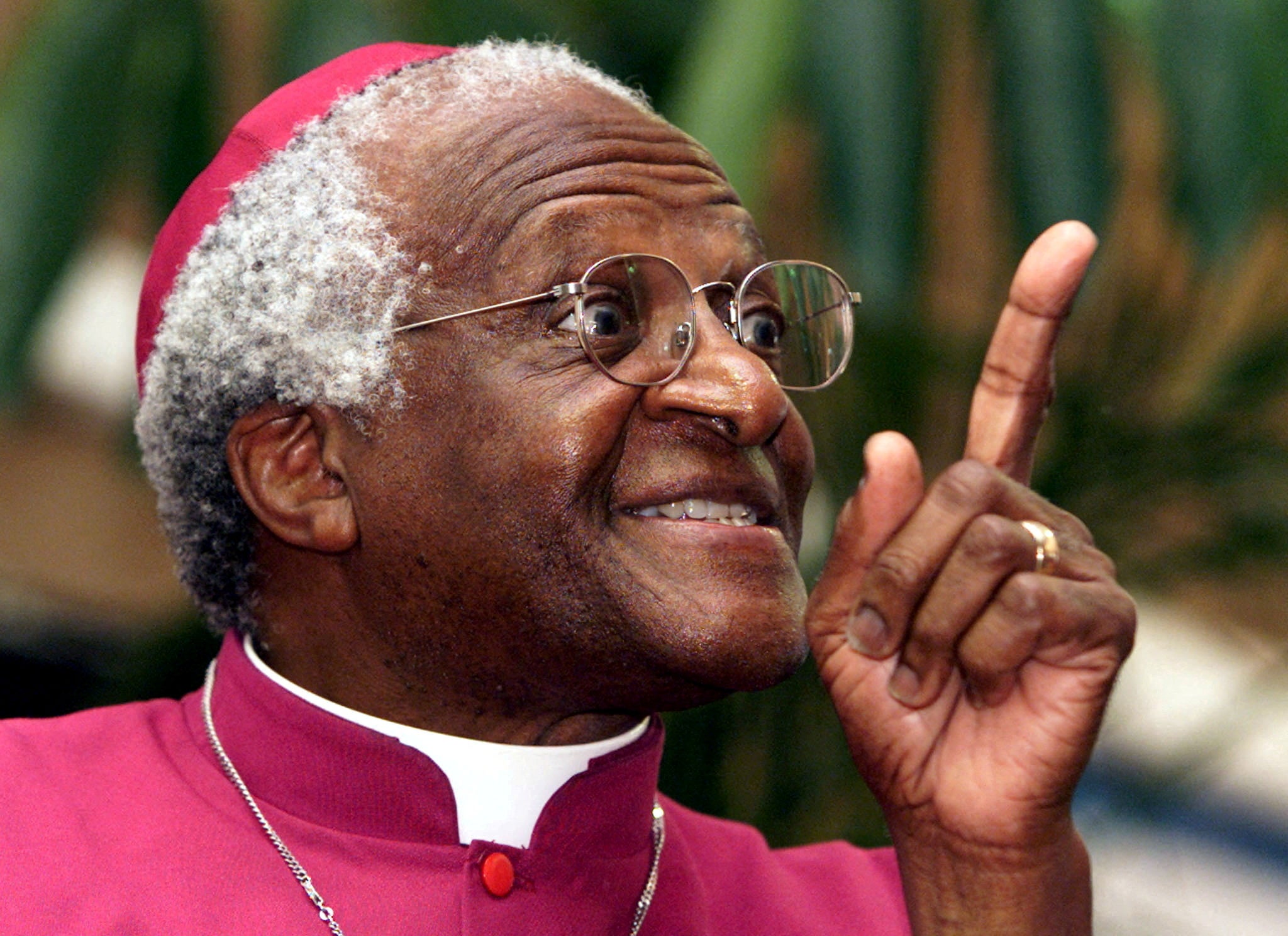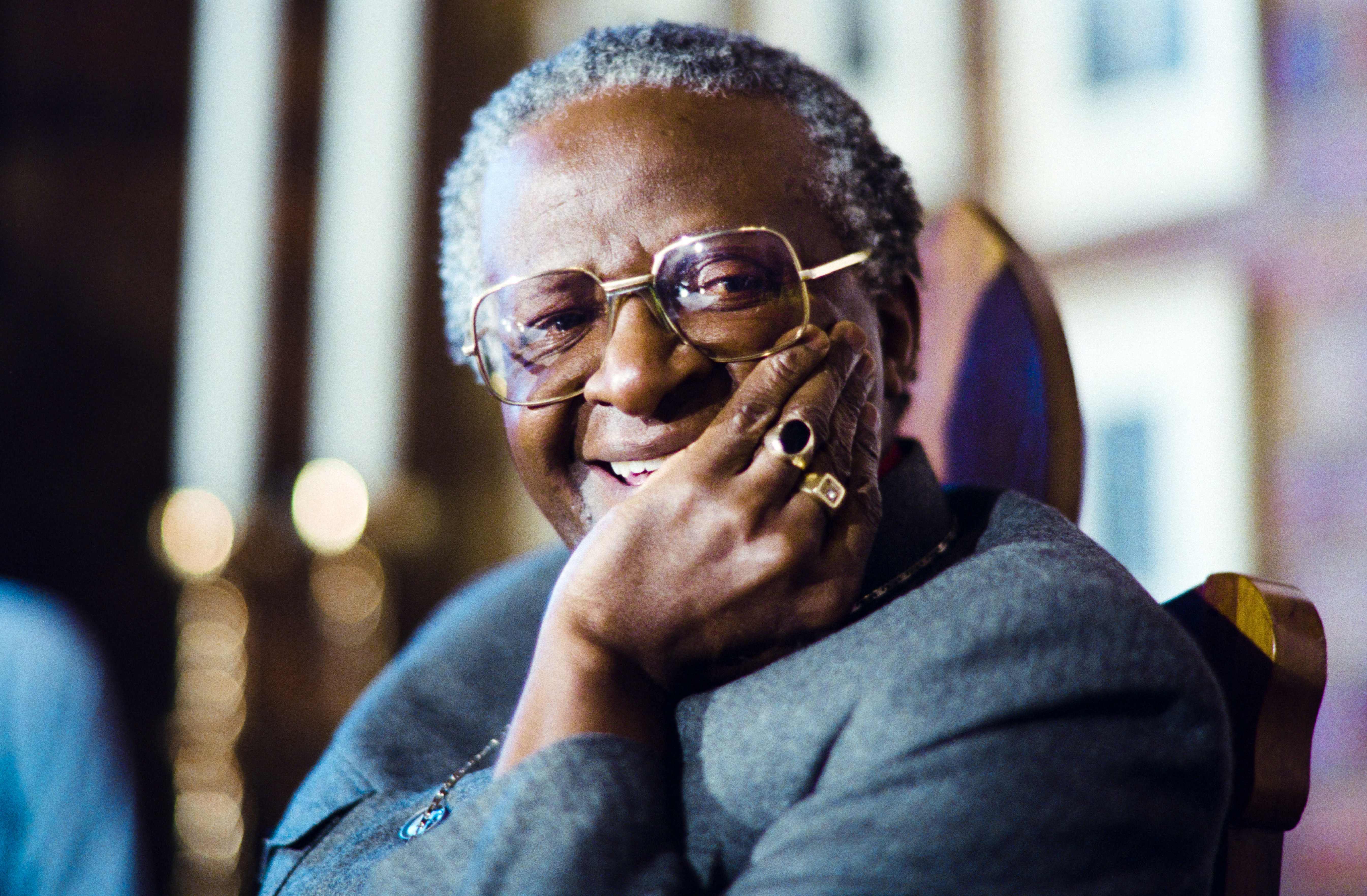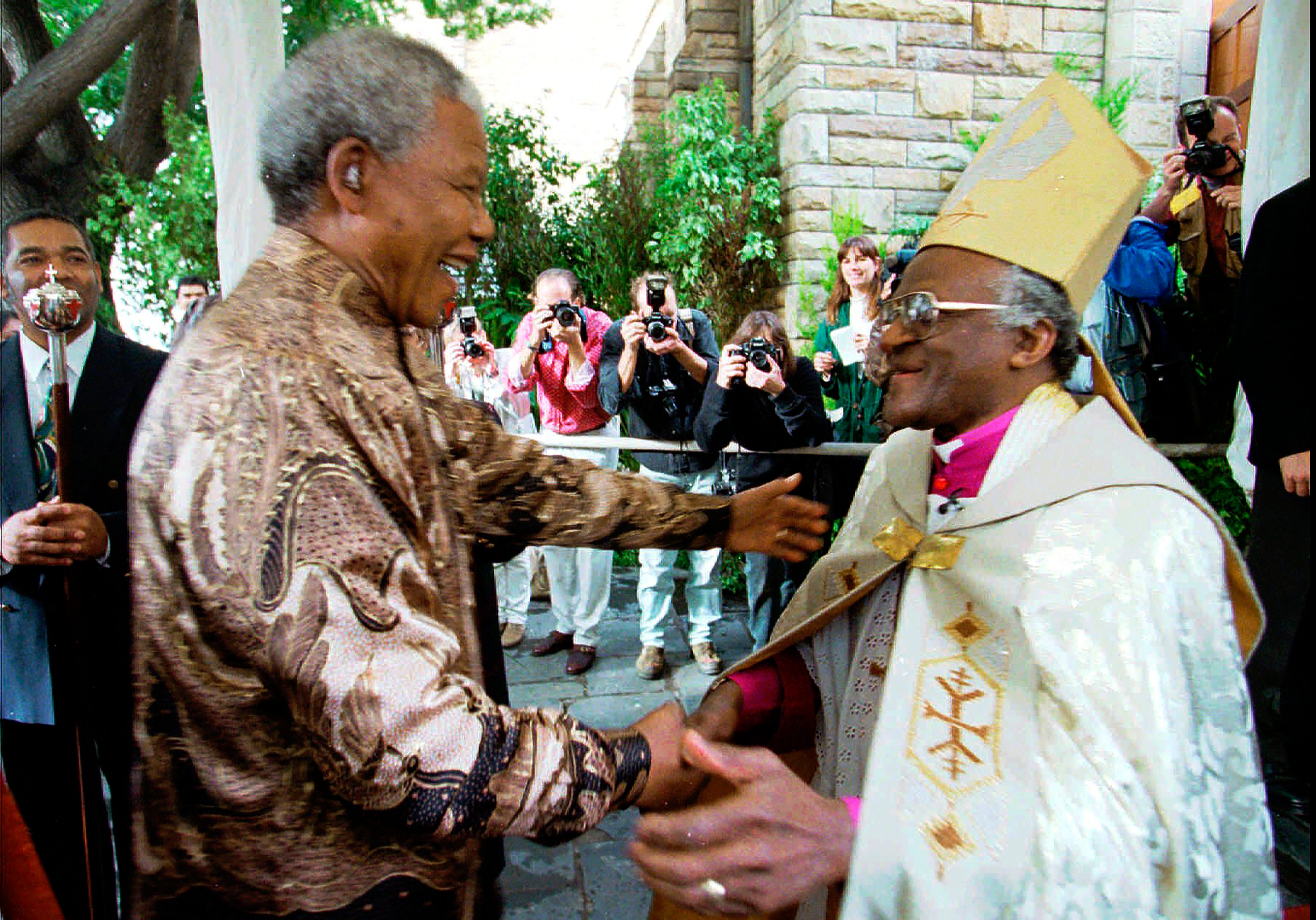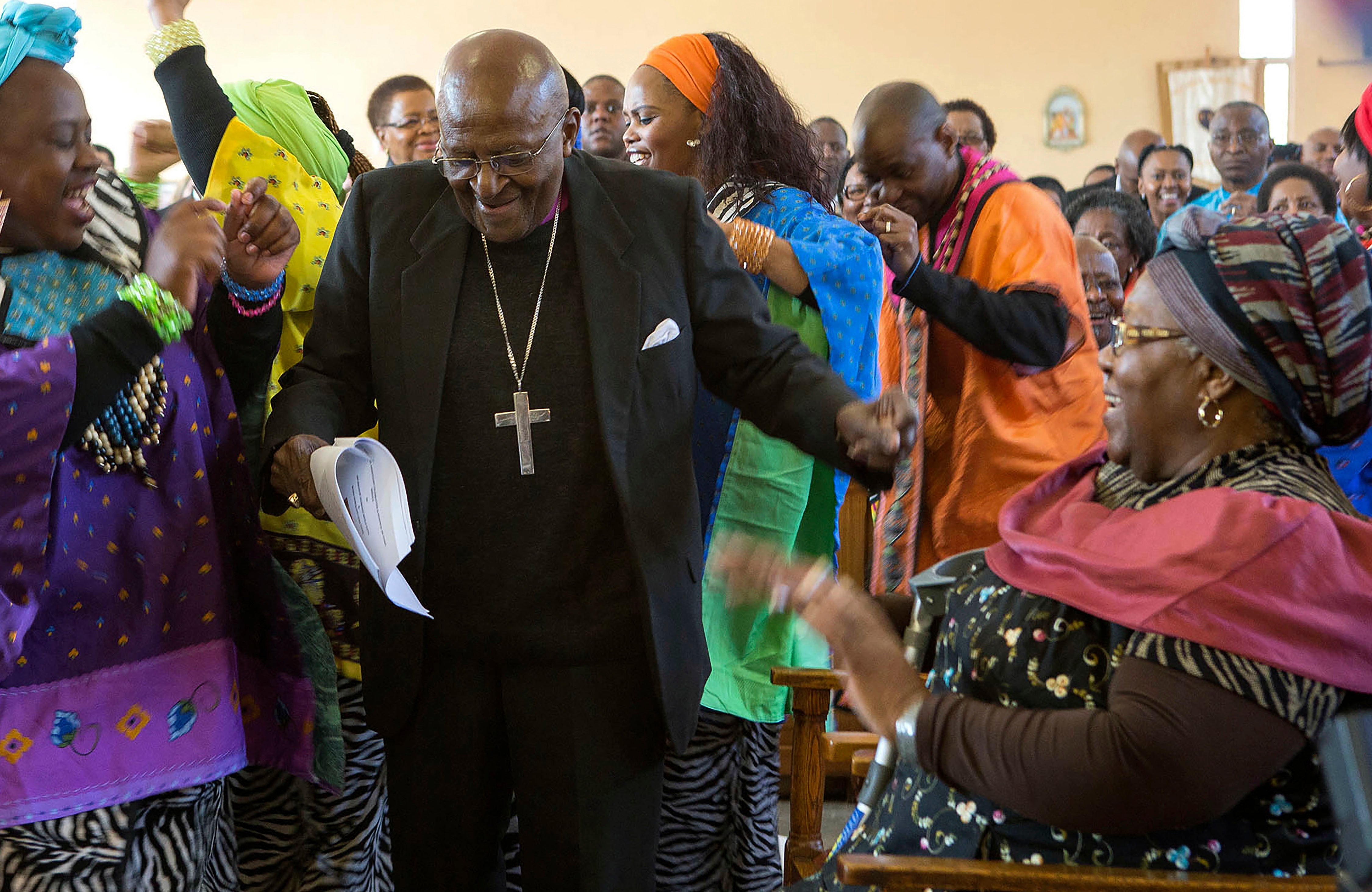Desmond Tutu: South Africa’s ‘moral compass’ who fought to end apartheid
The Nobel Peace Prize winner, famous for his tireless activism and tenacious spirit, died on Boxing Day

Your support helps us to tell the story
From reproductive rights to climate change to Big Tech, The Independent is on the ground when the story is developing. Whether it's investigating the financials of Elon Musk's pro-Trump PAC or producing our latest documentary, 'The A Word', which shines a light on the American women fighting for reproductive rights, we know how important it is to parse out the facts from the messaging.
At such a critical moment in US history, we need reporters on the ground. Your donation allows us to keep sending journalists to speak to both sides of the story.
The Independent is trusted by Americans across the entire political spectrum. And unlike many other quality news outlets, we choose not to lock Americans out of our reporting and analysis with paywalls. We believe quality journalism should be available to everyone, paid for by those who can afford it.
Your support makes all the difference.In his later life, Archbishop Desmond Tutu took great joy in recounting stories about his efforts to end apartheid in South Africa. The cleric also enjoyed cracking a joke or two while talking about the past.
“When I died, I went to heaven,” he said, tongue in cheek and with a shrug, while speaking to an audience in Cape Town about a decade ago.
In the archbishop’s imagined tale, St Peter hears banging at the doors of heaven and is surprised to find the devil standing there, asking him: “What are you doing here?”
“Well, you sent Bishop Tutu down and he is causing so much trouble I have come to ask for political asylum,” the devil responds.
On Sunday, the cleric’s distinguished sense of humour felt prescient – and tinged with poignancy.
The Nobel Peace Prize-winning activist and anti-apartheid veteran died at the age of 90 in Cape Town, leading to an outpouring of tributes at home and abroad for a man who worked tirelessly in the struggle to end white minority rule in South Africa.
One of the most extraordinary people of the 20th century, Mr Tutu was a man of many milestones.
Archbishop Tutu was known as the country’s “moral compass”, using his pulpit as the first Black bishop of Johannesburg and later Archbishop of Cape Town, as well as frequent demonstrations to galvanise public opinion against racial inequity.
He preached against the tyranny of white minority rule and, even after its end in 1994, he never wavered in his fight for a fairer South Africa, calling the divided country’s Black political elite to account with as much vigour as he had the white Afrikaners.
Mr Tutu also strived to draw awareness to a wide range of issues – including Israel’s occupation of the Palestinian territories, LGBT+ rights, and climate change – winning global acclaim for his activism while cementing his status as a well-loved figure.
The award of the Nobel Peace Prize in 1984 for his non-violent struggle against apartheid highlighted Archbishop Tutu’s stature as one of the world’s most effective champions for human rights, a responsibility he took seriously for the rest of his life.

With the end of apartheid and South Africa’s first democratic elections in 1994, Mr Tutu celebrated the country’s multi-racial society. Yet in his final years, he regretted that his dream of the “Rainbow Nation” had not yet come true.
Speaking on Sunday, South African President Cyril Ramaphosa said Mr Tutu’s death was “another chapter of bereavement in our nation’s farewell to a generation of outstanding South Africans who have bequeathed us a liberated South Africa”.
The first 60-odd years of Mr Tutu’s life ran in parallel with his country’s descent into darkness.
The 1910 Union of South Africa – a shotgun wedding of four unreconciled Anglo-Boer War states – had wasted no time in turning to repression. As early as 1913 the Natives Land Act had set aside 7.5 per cent of the land for 68 per cent of the population.
Desmond Mpilo Tutu, son of a Xhosa elementary school teacher and a Tswana domestic servant, was born into this voiceless black majority in 1931.
He grew up in Ventersdorp – a town west of Johannesburg which much later would gain notoriety as the headquarters of the neo-Nazi Afrikaner Weerstandsbeweging (AWB) – and believed as a boy that “the racist ordering of affairs was divinely ordained”.
Mr Tutu qualified as a teacher in 1953 and would have wanted to remain one, had the government of the day not set out deliberately to downgrade black education.
In a Roman Catholic township church that was later razed to make way for white housing, Mr Tutu married Leah Shinxani in 1955. Six years later, he was ordained, and the couple moved, with their first son, Trevor, to London.
Eventually he returned to South Africa, where his sharp intellect and charismatic preaching saw him rise through lecturing posts to become Anglican Dean of Johannesburg in 1975, which was when his activism started taking shape.
At every turn Mr Tutu lived and highlighted the perversity of apartheid. Political meetings would be banned and so a church service would be held instead.
Desmond Tutu’s voice will always be the voice of the voiceless
By now too prominent and globally respected to be thrust aside by the apartheid government, Mr Tutu used his appointment as secretary-general of the South African Council of Churches (SACC) in 1978 to call for sanctions against his country.
He was named the first black Archbishop of Cape Town in 1986, becoming the head of the Anglican Church, South Africa’s fourth largest. He would retain that position until 1996.
In the late 1980s, Archbishop Tutu offered his services as an intermediary to the then president, PW Botha. They were refused. But it is clear in retrospect that, even then, at the height of the political violence in South Africa, the apartheid regime knew it would sooner or later have to talk to the likes of “the Arch”, as he became known.
When this finally happened, it was through FW de Klerk. Tutu admired the president for his 1990 speech dropping the ban on liberation movements, but ultimately lost respect for him as he felt the leader refused to acknowledge the extent of the damage caused by apartheid.
In February 1990, Mr Tutu led Nelson Mandela on to a balcony at Cape Town’s City Hall where the ANC talisman made his first public address after 27 years in prison. He was at Mandela’s side four years later when he was sworn in as the country’s first black president.
"Sometimes strident, often tender, never afraid and seldom without humour, Desmond Tutu’s voice will always be the voice of the voiceless," is how Mr Mandela, who died in December 2013, described the archbishop.
It was appropriate that, after retiring as Archbishop of Cape Town in 1996, Mr Tutu should be appointed by Mr Mandela to chair the Truth and Reconciliation Commission (TRC).

This was a body charged with healing South Africa of 34 years of damage wrought from evil, and he hoped it would lead his countrymen and women, of all races, to rejoice in being “the Rainbow People of God”. But in his low moments the archbishop talked of having been a “wounded healer”, himself damaged, and sobbed through some of the victims’ accounts.
Mr Tutu did not like breaking down during the hearings because the media’s focus would then shift to him, away from the victims. But his vulnerability was vital to the non-retributive nature of the process. The TRC elicited forgiveness through truth, frailty, tears and prayer.
The archbishop bent over backwards to get Mr Botha to appear before the TRC. His overtures, sharply criticised at the time, ended up in a 1998 court case. Some people were simply impermeable to the unbounding optimism, charity, and humanity of the diminutive cleric.
However, his ability to state things succinctly yet with a flourish could not be underestimated.
“Reconciliation is like love,” he said in 1998, outside the court where the TRC was trying to subpoena Mr Botha. “It means taking a risk.”
Mr Tutu was devastated by the African National Congress’s attempt to gag the TRC’s final report in 1998 and its surliness in paying reparations to some of the 26,000 witnesses who told their story to the commission.
Nevertheless, the TRC has since become a model for many governments and organisations around the world eager to resolve tensions in post-conflict societies.
Mr Tutu was diagnosed with prostate cancer in 1997 yet stayed characteristically upbeat during his treatment and a subsequent relapse.
“When I was 12, doctors told my mother I would die from TB (tuberculosis). So, the last 56 years have been an absolute bonus,” he said in 1999.

Even in his twilight years, Archbishop Tutu continued to call out injustice at home and abroad.
In December 2003, he rebuked his government for its support for Zimbabwean president Robert Mugabe, despite growing criticism over his human rights record. Archbishop Tutu drew a parallel between Zimbabwe’s isolation and South Africa’s battle against apartheid.
He also criticised former president Jacob Zuma over allegations of corruption surrounding a $23m security upgrade to his home, and a previous leader, Thabo Mbeki, for his public questioning of the link between HIV and Aids.
Although the archbishop technically announced his retirement from public life in 2010 – just after his 79th birthday – his true nature got the better of him and he was unable to stay silent.
Mr Tutu also became well known for raising the issue of gay rights, and in 2013 said he was “as passionate about this campaign [for LGBT+ rights] as I ever was about apartheid”.
He was one of the most prominent religious leaders to advocate LGBT+ rights, and his public stance put him at odds with many in South Africa and across the continent, as well as within the Anglican church.
In July 2015, Mr Tutu renewed his 1955 wedding vows with wife Leah. The Tutus’ four children and other relatives surrounded the elderly couple in a church ceremony.
Towards the end of his life, he increasingly withdrew from the public sphere and spent more time with his family. Asked once how he wanted to be remembered, Archbishop Tutu said: “He loved. He laughed. He cried. He was forgiven. He forgave. Greatly privileged.”
Archbishop Desmond Tutu, South African Anglican bishop, theologian and human rights activist who fought against apartheid, born 7 October 1931, died 26 December 2021
Obituary writer Alex Duval Smith, former Africa correspondent, died aged 55 in 2019 after treatment for lung cancer



Join our commenting forum
Join thought-provoking conversations, follow other Independent readers and see their replies
Comments